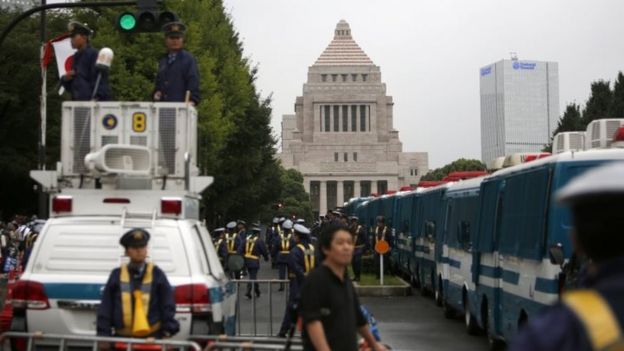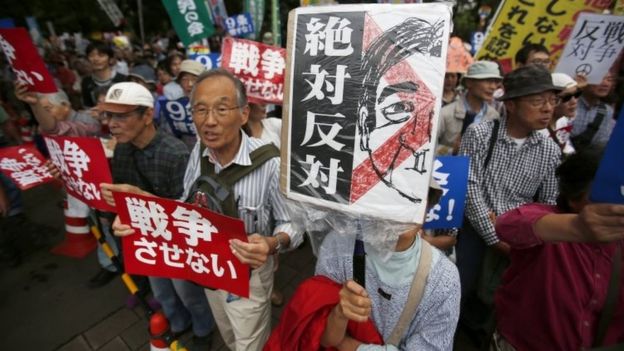
| Tracking the next pandemic: Avian Flu Talk |
Japan to allow military role overseas in historic |
Post Reply 
|
| Author | |
hachiban08 
Senior Moderator 

Joined: December 06 2007 Location: California, USA Status: Offline Points: 15627 |
 Post Options Post Options
 Thanks(0) Thanks(0)
 Quote Quote  Reply Reply
 Topic: Japan to allow military role overseas in historic Topic: Japan to allow military role overseas in historicPosted: September 18 2015 at 5:42pm |
Japan to allow military role overseas in historic movehttp://www.bbc.com/news/world-asia-34287362?OCID=fbasia&ocid=socialflow_facebook Japan's parliament has voted to allow the military to fight overseas for the first time since the end of World War Two 70 years ago. A vote on the new law was delayed for several hours as the opposition tried to stop the measure coming into force. Outside, demonstrators rallied in a last-ditch show of protest. Many Japanese are attached to the pacifist provisions in the constitution which banned fighting overseas. The bills have already passed through the government-dominated lower house.  There was heavy security outside parliament ahead of the vote There was heavy security outside parliament ahead of the vote
The government says that the changes in defence policy are vital to meet new military challenges such as those posed from a rising China. It wanted to hold the vote before a five-day holiday begins on Saturday. The governing coalition has a majority in both chambers of the Diet, meaning that ultimately the opposition camp was powerless to stop the measure becoming law. Masaaki Yamazaki, the president of the upper house, said the bills were passed with 148 lawmakers voting in support and 90 against. More than 200 hours have been spent deliberating the legislation, the Japan Times reported, and its approval by parliament fulfils one of Prime Minister Shinzo Abe's long-held ambitions. On Thursday, opposition politicians tried to physically delay proceedings ahead of a committee vote on the bills.  What is collective self-defence?Japan's post-World War Two constitution bars it from using force to resolve international conflicts except in cases of self-defence. Mr Abe's government has pushed for security legislation that would allow Japan's military to mobilise overseas when these three conditions are met:
What's behind Japan's military shift? The bills prompted large public protests for months. The changes re-interpret rather than formally change the constitution. But critics say this will violate the pacifist constitution and could lead Japan into unnecessary US-led wars abroad. Speaking in parliament on Friday, Akira Gunji, of the opposition Democratic party, said: "We should not allow such a dangerous government to continue like this. "Prime Minister Abe's security bill is a threat to our legal framework." Supporters of the measures, which are backed by Washington, insist they are essential for the defence of Japan and its regional allies, and will permit greater involvement in peacekeeping activities around the world. What kinds of military actions would the laws allow?
Critics have focused on what they say is ambiguity in how the principles of the legislation will be interpreted, and the possibility that future governments will interpret them more broadly. What do you guys think of this move? |
|
|
Be prepared! It may be time....^_^v
|
|
 |
|
hachiban08 
Senior Moderator 

Joined: December 06 2007 Location: California, USA Status: Offline Points: 15627 |
 Post Options Post Options
 Thanks(0) Thanks(0)
 Quote Quote  Reply Reply
 Posted: September 21 2015 at 11:43am Posted: September 21 2015 at 11:43am |
China warns Japan over expanding military role abroadhttp://www.bbc.com/news/world-asia-34301456 China has said Japan is endangering peace in the region after it passed controversial laws expanding the role of its military abroad. Japan should learn "profound lessons from history", China's defence ministry said after Japan's parliamentary vote. The vote allows Japanese troops to fight overseas for the first time since the end of World War Two 70 years ago. Tensions between China and Japan have escalated in recent months over a group of islands to which both lay claim. The security laws were voted through Japan's upper house late on Friday, with 148 lawmakers voting in support and 90 against. It followed nearly 200 hours of political wrangling, with scuffles breaking out at various points between the bills' supporters and opposition members attempting to delay the vote. Reaction snapshot:
The government says that the changes in defence policy are vital to meet new military challenges such as those posed from a rising China. But China's defence ministry said on Saturday they "run counter to the trend of the times that upholds peace, development and co-operation", the Xinhua news agency reports. "The move has breached the restrictions of Japan's pacifist constitution," the ministry added. Many
Japanese who opposed the bills - which prompted large public protests -
were also attached to the pacifist provisions in the constitution that
banned fighting overseas. China also urged Japan to "heed the security concern" of its Asian neighbours and do more to promote regional peace and stability. South Korea, which also has a tense relationship with Japan, has warned Tokyo not to exercise the new defence laws without its approval. But the US, Japan's ally, and the UK have both welcomed the changes. UK Foreign Secretary Philip Hammond said he looked forward to Japan "taking an increasingly active part in peacekeeping operations". What is collective self-defence?Japan's post-World War Two constitution bars it from using force to resolve international conflicts except in cases of self-defence. The new security legislation allows Japan's military to mobilise overseas when these three conditions are met:
What's behind Japan's military shift? Critics say the changes violate the pacifist constitution and could lead Japan into US-led wars abroad. Supporters of the measures insist they are essential for the defence of Japan and its regional allies, and will permit greater involvement in peacekeeping activities around the world. What kinds of military actions do the laws allow?
Critics have focused on what they say is ambiguity in how the principles of the legislation will be interpreted, and the possibility that future governments will interpret them more broadly. |
|
|
Be prepared! It may be time....^_^v
|
|
 |
|
Dutch Josh 
Adviser Group 
Joined: May 01 2013 Location: Arnhem-Netherla Status: Online Points: 95777 |
 Post Options Post Options
 Thanks(0) Thanks(0)
 Quote Quote  Reply Reply
 Posted: September 30 2015 at 3:17am Posted: September 30 2015 at 3:17am |
|
Japan is part of a coalition to "contain" China. The Philipines are its center, South Korea, Viet Nam, India and Australia are also supposed to play a role in that "coalition". http://www.globalresearch.ca/obamas-pivot-to-asia-nato-like-project/5478832
Since each country has its own interests you might wonder how long such a coalition could last. China-Russia (and Iran) play their own game. Viet Nam and the Philipines could give up interests in the East/South China-Sea for trade with China.
|
|
|
We cannot solve our problems with the same thinking we used when we created them.
~Albert Einstein |
|
 |
|
Post Reply 
|
|
|
Tweet
|
| Forum Jump | Forum Permissions  You cannot post new topics in this forum You cannot reply to topics in this forum You cannot delete your posts in this forum You cannot edit your posts in this forum You cannot create polls in this forum You can vote in polls in this forum |